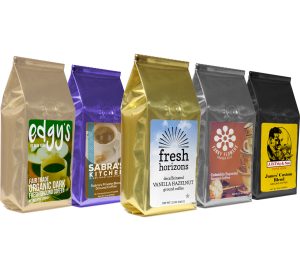Competition in the coffee industry is severe. Coffee lovers are always on the hunt for new and interesting tastes. Private label coffee is one option to consider if you want to get into the coffee business. This article goes into the subject of private label coffee, covering everything from what it is to how to launch your own private label coffee business.

What Is Private Label Coffee?
The practice of selling coffee goods under your brand name rather than the name of the original coffee roaster or supplier is known as private label coffee. This means you may develop your own coffee brand without having to start from scratch. It’s like putting your name on a tasty cup of coffee.
Benefits of Private Label Coffee
2.1 Customization
One of the primary advantages of private label coffee is the degree of customisation it provides. You may customize the taste profiles, roast degrees, and even the packaging to reflect the personality of your company.
2.2 Brand Control
You have complete control over your brand image when you use private labeling. Your coffee brand will be known for its distinctive products and high quality.
2.3 Market Potential
The coffee market is large, and private label coffee enables you to enter this profitable business without incurring the exorbitant expenditures of establishing your own coffee roastery.
The Process of Private Labeling Coffee
3.1 Sourcing Coffee
Finding a trusted coffee supply is the first step in private labeling. Look for one that provides a variety of coffee beans.
3.2 Creating Your Blend
Work with your supplier to develop a coffee mix that complements the taste characteristic of your brand. This is where the magic takes place.
3.3 Packaging Design
Create eye-catching packaging that represents the identity of your company. On the shelf, your packaging should stand out.
3.4 Labeling and Branding
Your business name and emblem should be clearly displayed on your coffee bags and labels. This increases brand recognition.
Finding the Right Private Label Coffee Supplier
4.1 Research
Spend some time investigating possible coffee providers. Choose a provider that has a high reputation for quality and dependability.
4.2 Samples
Request samples from several providers. Taste and analyze the coffee to verify that it fits your expectations.
4.3 Pricing
When selecting a provider, keep cost in mind. Check if their price corresponds to your company strategy.
Designing Your Coffee Packaging
5.1 Branding
Your brand’s packaging should represent its identity and communicate its narrative.
5.2 Eye-Catching Design
Create a design that will catch the attention of coffee enthusiasts. Your initial impression is formed by the packing.
Marketing Your Private Label Coffee Brand
6.1 Online Presence
Create a powerful internet presence. To reach a larger audience, use social media, a website, and e-commerce platforms.
6.2 Local Marketing
Don’t overlook local marketing. To get your brand out there, collaborate with local companies and coffee shops.
6.3 Promotions and Discounts
To persuade new consumers to try your coffee, provide unique specials and discounts.
Pricing and Profit Margins
7.1 Pricing Strategy
Decide on a pricing plan. Do you want to be a luxury brand or a mass market brand?
7.2 Profit Margins
Determine your profit margins. Make sure your price covers your expenses and leaves enough for profit.
Quality Control and Taste Testing
8.1 Consistency
Maintain a constant level of quality. Your clients should understand what they may anticipate from your coffee.
8.2 Taste Testing
Taste test your coffee on a regular basis to ensure it fits your flavor expectations.
Expanding Your Private Label Coffee Business
9.1 Product Line Expansion
Consider extending your product range to include coffee-related products in addition to coffee beans.
9.2 Wholesale Opportunities
Investigate wholesale options to get your coffee into additional retailers and cafes.
Challenges in the Private Label Coffee Industry
10.1 Competition
The private label coffee market is a cutthroat one. Make a statement with unique offers and powerful branding.
10.2 Quality Control
Maintaining constant quality as you develop might be difficult. Invest in quality assurance procedures.
Success Stories in Private Label Coffee
11.1 Case Studies
Learn from the success tales of private label coffee firms that began small and grew to become large.
Conclusion
Private label coffee offers a world of opportunities for coffee entrepreneurs. With the appropriate approach, you can build a profitable coffee brand that appeals to coffee enthusiasts. Begin your adventure in the world of coffee and explore where your own blend leads you.
FAQs
1. How much does it cost to start a private label coffee brand?
Depending on your size and quality needs, starting a private label coffee business might cost anywhere from a few thousand dollars to many tens of thousands of dollars.
2. How do I find a reliable coffee supplier for private labeling?
Investigate possible coffee suppliers, request samples, and verify their industry reputation.
3. Can I sell my private label coffee online?
Yes, you may sell your private label coffee through a variety of internet outlets, including your own website and e-commerce sites.
4. What is the difference between private label coffee and branded coffee?
Private label coffee is sold under your brand name, while branded coffee is sold under the brand of the original roaster.
5. How can I ensure the quality of my private label coffee?
Maintaining the quality of your private label coffee requires regular taste testing and quality control techniques.

















